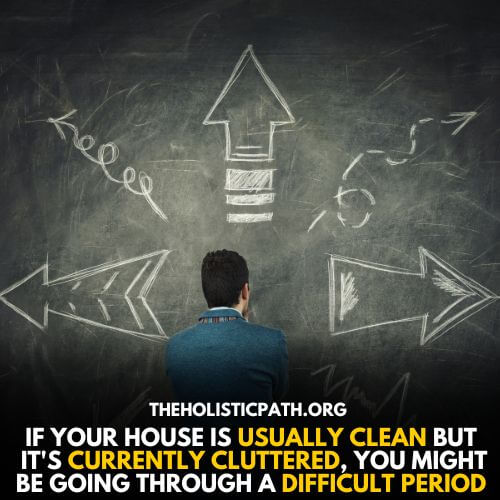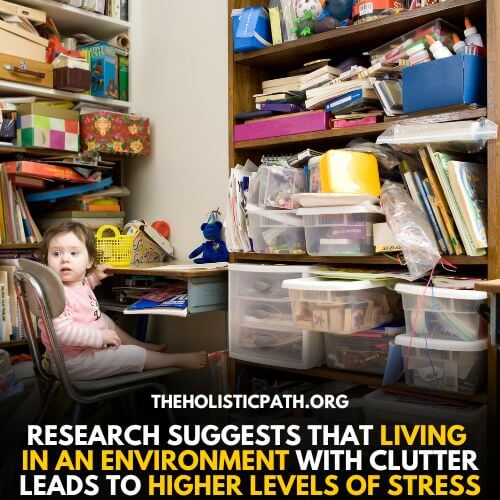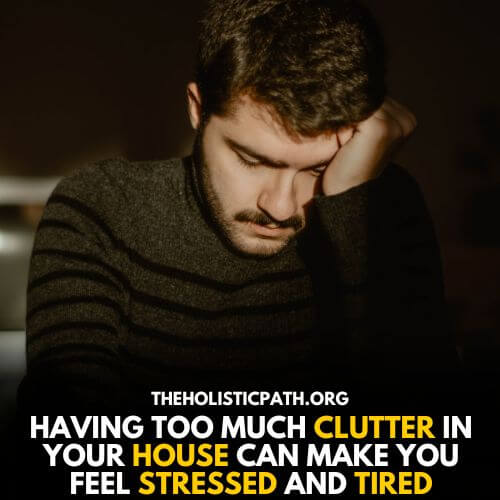Have you ever felt overwhelmed by the amount of mess and clutter in your house? It may seem like a harmless thing but is a cluttered house actually an indication of underlying depression? Is it true that if someone’s house is overflowing with piles upon piles of stuff, this is a sign of depression or is it simply an inefficient way to live?
In this article, we will be looking into whether is really true that; is a cluttered house a sign of depression. We’ll explore the myths, research, and institutional perspectives on the issue and hopefully conclude with some actionable tips for tackling this problem. Let’s get started!
Is Clutter House A Sign Of Depression?
Clutter can be a sign of depression in some people, but it is important to note that it is not always an indicator of mental health issues. While some individuals may suffer from hoarding disorder, which can be a symptom of mental illness, there are also individuals who simply have disorganization habits that may lead to clutter in their lives.
Clutter can be caused by a variety of factors such as procrastination, or having too much stuff and not enough storage space. Clutter can also be caused by an individual’s emotional state, such as stress, depression, or anxiety. Clutter is often an outward expression of internal turmoil and unresolved emotions.
People who are depressed often struggle with having the energy to keep up with basic tasks like tidying up the house or apartment. This lack of motivation leads to physical clutter accumulating around them.
Clutter can also affect our minds negatively.
When there is disorder and chaos around us, it becomes increasingly difficult to focus on what needs to be done, leading to further procrastination and feelings of helplessness and guilt. Studies have shown that environments filled with clutter can cause increased stress levels and higher levels of cortisol in the body—the hormone associated with stress—which further contributes to feelings of depression.
On the other hand, eliminating clutter from your home has been linked to improved physical health, better moods, reduced anxiety levels, and even more restful sleep for those suffering from depression. It can help create an environment that is comforting and calming rather than chaotic and overwhelming; one that encourages productive activities like reading or staying active instead of ruminating on negative thoughts or emotions.
Why Do People With Depression Have Cluttered House: 5 Reasons
People with depression may often have a cluttered house for various reasons. The following are some of the most common explanations for this problem:
- Depression can lead to an overwhelming feeling of apathy, meaning that people with depression struggle to motivate themselves to take care of their living space or keep it tidy. This means that tasks such as washing dishes, doing laundry, and other forms of cleaning become too onerous and difficult to manage, leading to a build-up of clutter in the home.
- People with depression also often find it hard to concentrate and focus, making them less able to remember and prioritize tasks such as tidying up or organizing their homes. As a result, those affected by depression may put off cleaning and organizing until it becomes an unmanageable task that is too daunting to tackle.
- Low self-esteem is often one of the most common symptoms associated with depression, leading sufferers to feel as though they don’t deserve better living conditions or surroundings. This can mean that the person doesn’t feel worthy of creating a pleasant environment in which they can relax and be comfortable. Also, when someone feels bad about themselves, they may use their physical environment as a reflection of this inner turmoil – i.e., if they think they’re “a mess” inside, then their outer environment will become messy too.
- Depression can also cause individuals to experience difficulty in making decisions due to low self-confidence and low motivation levels. This inability or reluctance to make decisions can further contribute to clutter building up in the home because there is no impetus or plan for tidying up around the house or throwing away unwanted items.
- Depression can also be linked with financial hardship; people who are depressed may not have enough money or resources available in order to purchase items needed for storage solutions or tidying up (such as bins or cupboards). This lack of financial resources can mean that clutter remains around the house as there isn’t any way available for these items to be stored neatly away from sight.
Lack Of Motivation: A Common Cause
When depression sets in, a lack of motivation can be an overwhelming problem. This can have a profound impact on a person’s living space, resulting in a cluttered house. This is because those suffering from depression often struggle to find the energy or enthusiasm to take care of their own home and the things within them.
Here are several ways this mental illness can lead to clutter:
1. Procrastination:
A person with depression may find it hard to get started on any task, including housework. This can lead to a build-up of mess in the home as they are unable to make a start on cleaning, tidying, and organizing.

People with depression may allow tasks like cleaning and organizing to become overly daunting, which leads them to procrastinate and delay doing them. This habit can easily cause problems such as messy rooms, piles of unwashed laundry, and overflowing junk drawers.
2. Avoidance:
As depression can cause an individual to feel overwhelmed and exhausted, they may begin to avoid doing any tasks as a means of self-preservation. This could manifest in avoiding housework and maintenance, leading to a build-up of clutter that creates an unpleasant living space for the person suffering from depression.
Those affected by depression may instinctively avoid areas that make them feel guilty or overwhelmed with the amount of work they should have done but haven’t yet completed. They may view these areas as too difficult to even think about tackling and subconsciously steer clear of them – resulting in more mess and clutter.
3. Hoarding:
Depression can sometimes be accompanied by hoarding tendencies; where people keep items for sentimental reasons or fear throwing away something that might be needed later on. This behavior creates physical clutter that doesn’t get organized properly and accumulates over time until it becomes overwhelming for anyone trying to clean up the mess.
This habit can lead to clutter as rooms are filled with hundreds of knick-knacks, magazines, and other random objects.
Not only does this make the home more chaotic but it can also affect emotional well-being and further contribute to depression. Hoarding is a complex disorder that can be linked with depression, but there are ways of dealing with it.
4. Lack of Focus:
Depressed individuals also tend to lose focus quickly when working on tasks that require sustained attention, such as cleaning or organizing their homes. This makes it difficult for them to complete these tasks in a timely manner – leading to more messiness and disorganization in their living space.
Even when trying to start organizing and tidying, an individual may struggle to stay focused on the task at hand. This often leads to incomplete projects or even worse, a further build-up of mess.
5. Poor Prioritization:
Those suffering from depression often struggle with prioritizing tasks correctly or efficiently managing their time due to symptoms such as low energy levels or sleep disturbances. People May also not prioritize housework, meaning it becomes less of a priority in their life.
This can result in clutter and messiness as other tasks or activities take precedence.
Other things such as going to work, spending time with family, or attending social events may be given higher importance than cleaning the home – making it more difficult for them to keep their living space organized and tidy. As a result, they may not appropriately prioritize tasks like cleaning which then takes a backseat – allowing clutter to accumulate instead of being taken care of regularly.
All these issues related directly to depression can lead to increasingly cluttered houses if not addressed properly and taken care of on schedule – ultimately impacting their ability to live comfortably in their own homes due to increased stress from disorderliness around them.
What Does A Cluttered House Say About You: 3 Things
A cluttered house can say a lot about a person. It can be a sign that they are messy and disorganized, or it can be a sign that they have too much stuff and don’t know how to get rid of it.
It can also be a sign that they are going through a tough time and can’t keep up with the cleaning. Whatever the reason, a cluttered house is not a good thing.
Here are some things that a cluttered house says about you:
1. You’re Messy And Disorganized
This is the most common interpretation of a cluttered house. If your house is cluttered, it means that you’re not good at keeping things clean and organized. You probably have a lot of stuff that you don’t need, and you don’t know how to get rid of it.
This can be a problem if you’re trying to sell your house or rent it out because potential buyers or renters will see the clutter and think that you’re not taking care of the property.
2. You Have Too Much Stuff
If your house is full of stuff, it means that you’re holding on to things that you don’t need. Maybe you’re sentimental and you can’t bear to get rid of anything, or maybe you just don’t know how to downsize.
This can be a problem if your house is so full of stuff that you can’t move around easily, or if you’re spending more money on storage fees than you’d like.
3. You’re Going Through A Tough Time
If your house is usually clean but it’s currently cluttered, it might mean that you’re going through a difficult period in your life. Maybe you’ve had a death in the family or you’ve lost your job.

Whatever the reason, if your house is cluttered because you just can’t keep up with the cleaning, it’s understandable. However, if this is a long-term situation, it might be time to get some help from friends or family members.
A cluttered house says different things about different people. But generally speaking, it’s not a good thing. If your house is cluttered, try to do something about it.
Teen With Cluttered And Messy Rooms: What Does It Say
A messy bedroom can be a sign of depression in teens for several reasons. First of all, it may be an indication that the teen isn’t taking care of themselves or their surroundings. Not only does this reflect on their mental state but it can also lead to physical issues such as increased stress levels and even illness.
Additionally, if the teen is not cleaning their room regularly then they may have less motivation to do other tasks such as school work which could lead to academic difficulties. Finally, the mess itself could be due to the fact that the teen is struggling with clutter management; something which is often related to anxiety or depression.
The idea of whether a messy teen room is indicative of depression has been studied by many researchers, and there are mixed conclusions.
To better understand the potential connection between a cluttered environment and depression, it is important to consider some of the factors at play.
Effects on Mental Health:
- A messy room can lead to increased stress levels due to its disorganization. For teens who already suffer from anxiety or depression, this can further exacerbate their condition.
- Clutter and mess are often associated with feelings of guilt and shame, which could further lead to negative self-talk and mental health issues.
- Living in an untidy space can be distracting, making it difficult for someone suffering from depression to focus on tasks or activities that could help them cope with their condition.
- It is believed that clutter can also have an effect on someone’s mood, as it could make them feel overwhelmed by having too much stuff around them.
Possible Causes:
- Poor time management skills – not having enough time to keep up with cleaning can lead to messier rooms over time, leading to more stress when things get out of hand.
- Low self-esteem – feeling like their space is a reflection of themselves and believing they don’t deserve better may prevent teens from taking care of their environment any further.
- Avoidance – being overwhelmed by the thought of organizing or cleaning up can lead some teens to simply avoid dealing with mess altogether, leading to an even bigger problem over time.
Can We Draw Conclusions?
- It cannot be said definitively that a messy teen room means they are depressed; however, there does appear to be a correlation between environmental clutter and mental health issues.
- The effects of living in a disorganized environment may vary from person to person; what may seem like an ordinary level of messiness for one person may have more severe consequences for another individual who is struggling psychologically or emotionally.
- Ultimately, it is important for both parents and teens alike to recognize the potential impact that clutter and disorganization may have on mental health so that appropriate steps can be taken if necessary.
Does A Messy House Make You Depressed?
When it comes to the relationship between messiness and depression, research on the subject indicates that there is a significant correlation between them. A messy house can not only increase stress levels and lead to feelings of disorganization, but it can also have a direct impact on an individual’s mental health. While it is true that a messy house does not necessarily cause depression, one’s environment has been shown to have an influence on mood and feelings of satisfaction.
For starters, research suggests that living in an environment with clutter leads to higher levels of stress.

According to one study from Princeton University, clutter can be “overwhelming” for many individuals and create a feeling of being “out-of-control” in one’s own home. This experience can then result in elevated cortisol levels (the hormone associated with stress) as well as higher blood pressure and heart rate.
Not only can messiness affect an individual’s present mental state, but it has been linked to contributing to poor decision-making in the future as well. Because messiness makes people feel overwhelmed and stressed out, they often become less motivated to tackle tasks or make decisions that require effort or planning – both of which are essential components of mental well-being.
Additionally, if a person spends too much time trying to keep their surroundings clean and organized at the expense of other important activities such as exercising or socializing with friends, this could lead to a feeling of isolation which is connected with depressive symptoms.
In addition to the physical side effects of having too much clutter around us, it should also be noted that messiness has psychological implications as well – specifically when it comes to our sense of accomplishment or pride concerning our homes.
A 2012 survey by Home Organizing Experts found that 89% of participants reported feeling more relaxed in clean spaces than messy ones; 72% said they felt embarrassed when their guests saw their home unorganized; and 57% revealed they felt depressed after seeing their cluttered surroundings. Clearly, there is some type of connection between messiness and negative emotions.
Can Clearing Up Clutter Improve Mood: 4 Effective Ways
Yes, clearing up clutter can improve mood. Studies have shown that psychological and physical benefits can be gained from an organized and uncluttered environment. The following are some of the ways that clearing up clutter can improve mood:
- Physically Clearing Clutter Reduces Stress: Clutter is visually distracting and can be overwhelming, especially when there is a large amount of it. Studies have found that people with cluttered environments reported more stress, fatigue, and hindrances in concentration compared to those who had clean and orderly spaces. By physically getting rid of the clutter in a space we are able to reduce stress levels by eliminating the visual distraction and allowing us to focus on activities that we want to complete.
- Mental Benefits of an Organized Space: Studies have indicated that maintaining organization in our lives can help clear the mind, improve productivity, and make life easier overall. When things are well-organized it makes it easier for us to find what we need when we need it without wasting time searching for lost items or forgetting where something was kept. It also reduces decision fatigue as we don’t have to worry about which item should go where or take time deciding between two seemingly equal choices.
- Improves Confidence Levels: Having an organized space conveys a sense of competence and control over one’s environment which leads to increased confidence levels. This improved feeling then carries into other areas of life such as work or school where decisions need to be made quickly or under pressure. Additionally, having a tidy home means less time spent cleaning up after ourselves which creates more free time for leisure activities or tasks that bring joy instead of dread.
- Enhances Creativity: Clutter has been linked to increased anxiety, stress, and lack of focus which could stifle creativity when trying to think outside the box or problem-solve effectively. An organized environment allows us to think more clearly when coming up with creative solutions as there is no physical distraction preventing our minds from exploring new ideas freely. A neat space also ensures all materials needed are within arm’s reach so there will not be any interruptions while working on projects or brainstorming fresh concepts.
5 Tips For Decluttering Your House With Depression
Having too much clutter in your house can make you feel stressed and tired. It can also make you feel embarrassed when people come over and it can even make you sad. To help, here are some tips to help declutter your house if you have depression:
- Break the task down into small manageable tasks: When decluttering, try breaking the entire job down into smaller tasks that won’t take long to do. This will make it easier for you to stay motivated as there will be a sense of accomplishment every time one of these mini-tasks is completed.
- Have a plan: Before starting, create an action plan with clear goals that are achievable and realistic so it is easy to stay on track while tidying up the space. Having a plan also allows us to focus our efforts on specific areas which saves time in the long run by preventing us from having to double back or clean up things more than once.
- Get rid of items that no longer serve a purpose: Take some time out of each day or week to go through all items in the house and decide what needs to be kept and what should be thrown away or donated. If there are sentimental objects that may trigger negative emotions or past memories it is best to store them away in boxes or bags and put these out of sight.
- Designate a clutter-free zone: Choose one room in the house that will always remain completely organized and free of clutter. This could be a kitchen, study space, or living area where all materials can be kept neat and tidy for easy access when needed.
- Ask for help: Don’t be afraid to ask family members or friends to lend a hand as decluttering can be an overwhelming task. Having someone else present also helps keep us motivated and accountable as we work together toward achieving the same goal.
- Get rid of anything that doesn’t bring you joy. One of the best ways to declutter your home is to get rid of anything that doesn’t make you happy. If there’s something in your home that you don’t use or that doesn’t bring you joy, get rid of it!
- Donate items that are in good condition. If you have items in your home that are in good condition but that you don’t use or need, consider donating them to charity. This is a great way to declutter your home and help others at the same time!
- Sell items that are in good condition. Another option for getting rid of items that are in good condition but that you don’t need is to sell them. You could have a garage sale, sell items online, or take them to a consignment shop.
- Recycle or trash items that are in poor condition. If you have items in your home that are in poor condition and that you don’t want to keep, recycle or trash them instead of holding onto them indefinitely.
- Invest in storage solutions. If you find yourself struggling with cluttered surfaces even after getting rid of unnecessary items, invest in some storage solutions such as baskets, bins, and shelves. This will help keep your belongings organized and make your space feel less cluttered overall.
- Keep things tidy on a daily basis. Once you’ve decluttered your home and put some storage solutions in place, it’s important to keep up with the tidying on a daily basis. This means putting things away after using them and taking the time to straighten up any areas that start to look cluttered again.
- Give yourself permission to let go: A lot of times we hang onto things because we feel like we should, even if we don’t really want them. Give yourself permission to let go of those things and live more simply.
- Simplify your space: Once you’ve decluttered your home, take a look at the remaining items and see if there are ways to simplify them further. For example, if you have a lot of clothes, consider getting rid of some of your hangers or storing out-of-season clothes elsewhere.
- Take it one step at a time: When dealing with depression, it is important to not overwhelm yourself. Make sure to break the task of decluttering into smaller steps. This will make it easier to manage and will make progress more achievable.
By following these tips, we can make a huge difference in our living space and improve mental health by reducing stress levels and creating a more peaceful environment. The proper organization also ensures that our home is neat and presentable for any visitors which will give us a sense of pride and accomplishment each time someone enters.
Decluttering may seem like an uphill battle but with consistency and commitment, it can be done.
Conclusion
All in all, a cluttered house could certainly be an indication of depression, and it wouldn’t hurt to reach out if you’re concerned about a loved one. This isn’t to say that everyone with a messy house is struggling with mental health issues, as it could simply be a sign of disorganization or efficiency.
But if there are other signs present such as sleeping too much or not eating enough, it’s important to check in and make sure the person is doing alright. We all have our ups and downs and sometimes we all just need someone to talk to – so don’t be afraid to lend an ear.
References
George, B. (2021, March 29). The Link Between Clutter & Your Mental Health. https://anzmh.asn.au/blog/mental-health/link-between-clutter-and-mental-health
Smith, D. G. (2023, January 10). Why Clearing Clutter Can Feel Impossible. The New York Times. https://www.nytimes.com/2023/01/10/well/mind/depression-cleaning-clutter.html

